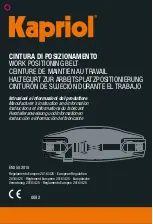
14
The Short Stop System
The Short Stop system is composed of three
critical components: the electronic unit, the reel set
screw, and the trolling weight insulator.
While the downrigger cable is in the water, there
is a minute electrical current that flows between the
cable and the grounded metal boat components in
the water. When the cable clears the water, this
current flow will stop. The Short Stop system senses
this interruption and turns off the motor. The trolling
weight insulator is used to break the cable contact to
the water while the weight is still in the water. The
reel set screw allows the circuit path to be made
through the structure of the downrigger.
NOTE:
It may be necessary to use two trolling
weight insulators.
Stopping the weight at water level eliminates the
cable strain caused by bouncing weights or weights
hitting the boom end. Stopping at water level will
also keep the weight from hitting the boat hull.
Weight
Insulator
Cable
Terminator
1/16"
Short Stop System
The Positive Ion Control System
Your boat has an electrical charge around the
hull in water. If a boat is properly bonded and
properly zinced, that charge should be slightly
positive when measured from ground to the
downrigger cable. Positive Ion Control (PIC) is the
use of electricity to control that charge and its
fluctuation so that it is always maintained at a
specified set voltage.
The practice of setting up and maintaining a
slight positive charge on fishing gear has been used
by commercial fishermen for many years. This
practice has enabled some fisherman to increase
yield when used along with other good fishing and
boating practices.
Cannon’s electric downriggers offer fishermen a
big advantage in being able to stabilize and control
the positive charge around their boat. Because of
the Lexan® construction of the frame, Cannon
downriggers are insulated from your boat’s hull
charge. When the stainless steel downrigger cable is
lowered into the water, the natural ionization
between the cable and the boat creates a positive
charge of 0.7 to 0.9 volts in saltwater and 0.3 to 0.6
volts in fresh water. This natural voltage is
dependent upon salinity and mineral content of the
water. Your actual voltage may vary.
THE SHORT ST
OP S
Y
S
T
EM














































